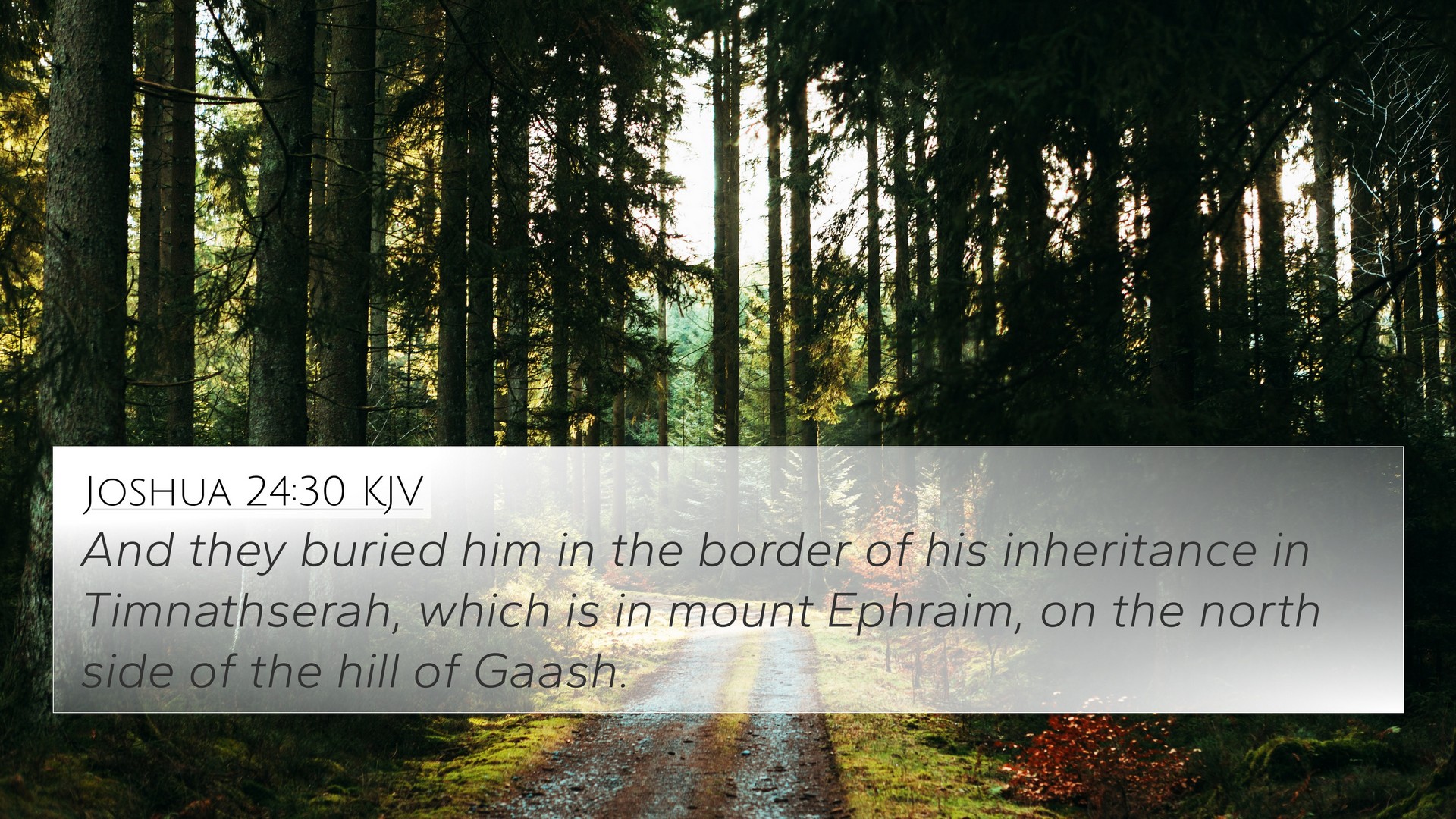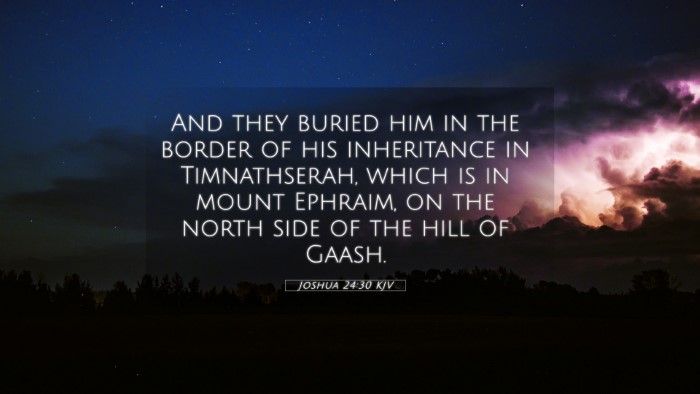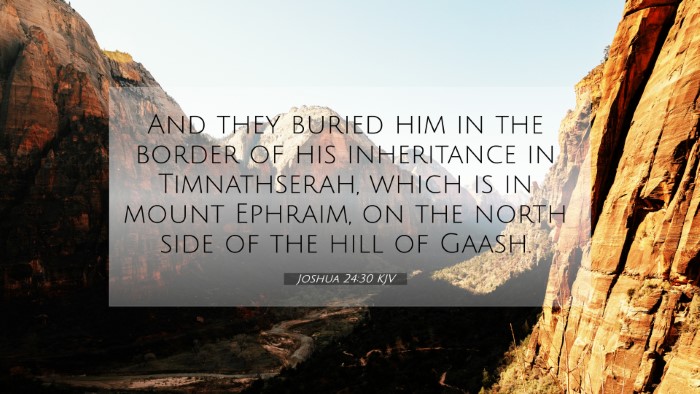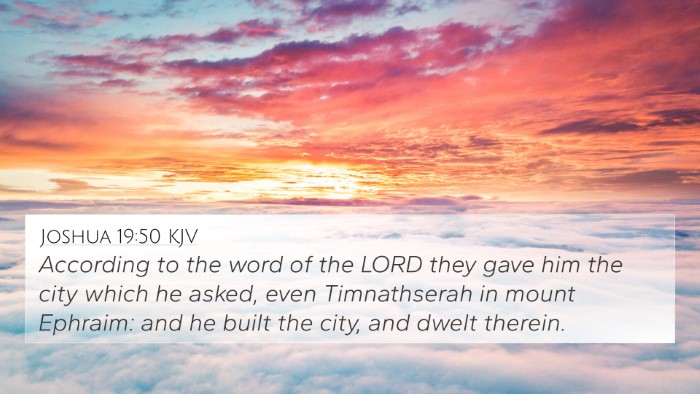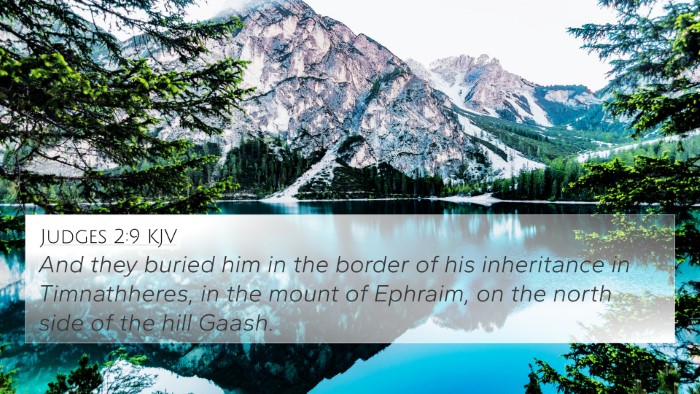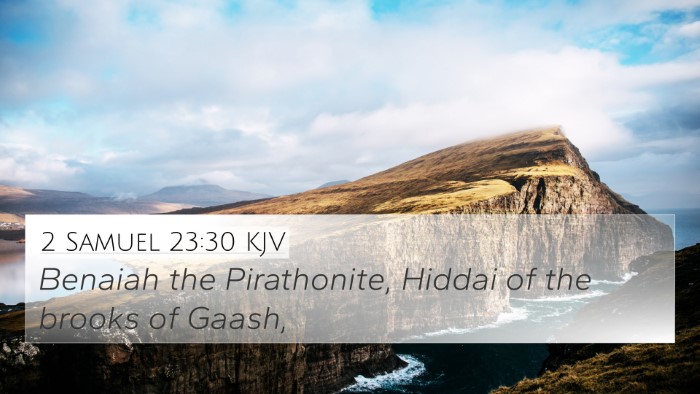Understanding Joshua 24:30
Joshua 24:30 states: "And they buried him in the border of his inheritance in Timnathserah, which is in mount Ephraim, on the north side of the hill of Gaash." This verse marks a significant moment in the narrative of Joshua, emphasizing the conclusion of his life's work and leadership over Israel.
Summary of the Verse
The burial of Joshua signifies the end of an era for the Israelites. It reinforces themes of legacy and inheritance, reminding believers of the land promises made to the patriarchs. The choice of burial site, in Timnathserah, is emblematic of the fulfillment of God's promises and the faithfulness of His covenant.
Contextual Analysis
This verse appears towards the end of the book of Joshua, which outlines the conquest and division of the Promised Land. Joshua, as a leader, was instrumental in guiding Israel to fulfill God's plan. His burial not only signifies personal closure but also the transition of leadership and responsibility back to the tribes of Israel.
Thematic Connections
This passage ties into several significant Biblical themes:
- Legacy: Joshua's death marks a pivotal moment in Israel's history, calling attention to how leaders shape their communities and the importance of leaving a godly inheritance.
- Fulfillment of Promises: The burial in the allocated territory demonstrates God's faithfulness in delivering the land to Israel.
- Transition of Leadership: This moment serves as a critical transition in leadership from Joshua to the elders who would lead Israel in the coming years.
Bible Cross-References
Understanding Joshua 24:30 can be enriched through inter-Biblical dialogue. Here are several relevant cross-references:
- Deuteronomy 34:5-6: The account of Moses's death and burial, paralleling Joshua's own passing and highlighting the transition of leadership.
- Hebrews 4:8: A New Testament reflection on the rest that God promises, relating to the Israelites' settlement in the land.
- Joshua 1:2: God's commissioning of Joshua corresponds directly to his eventual fulfillment of leading the Israelites into the Promised Land.
- Genesis 49:29-30: The burial plots associated with the Patriarchs, emphasizing the significance of homeland and inheritance.
- Joshua 23:14: Joshua's farewell address, providing a context of warnings and assurances, reinforcing the covenant theme leading up to his death.
- Psalm 78:68-70: God's choice of leadership among His people, linking God's guidance of Israel under Joshua with the covenantal narratives.
- Acts 7:45: A reference to the fulfillment of God's promises to Israel, where Stephen recounts God's faithfulness in history, reflecting upon the land that Joshua's leadership realized.
Insights from Public Domain Commentaries
Drawing upon commentaries from Matthew Henry, Albert Barnes, and Adam Clarke provides deeper insights:
- Matthew Henry: Emphasizes the solemnity of Joshua's burial as an indication of the end of his responsibilities and the assurance of God’s unwavering promises to Israel.
- Albert Barnes: Suggests that the location of the burial is symbolic of heritage and the continuation of God's work among His people in the land He provided.
- Adam Clarke: Highlights the importance of legacy in this verse, noting that the place of Joshua's burial signifies not just a physical location but a spiritual inheritance for future generations.
Conclusion
Joshua 24:30 serves as a powerful reminder of God's faithfulness and the importance of leadership inheritance. The connections this verse has with other scriptural texts highlight the interconnectedness of Biblical narratives and the timeless truths they convey. Utilizing cross-referencing tools can deepen one’s understanding of these connections, encouraging a more integrated study of God’s Word.
In studying this verse and its surrounding themes, believers are invited to reflect on their spiritual inheritance and the eternal promises of God.
